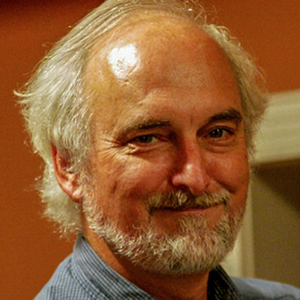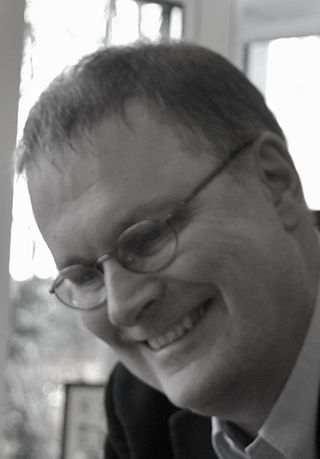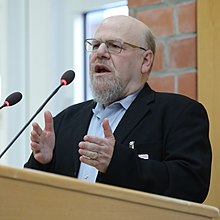
Judea Pearl is an Israeli-American computer scientist and philosopher, best known for championing the probabilistic approach to artificial intelligence and the development of Bayesian networks. He is also credited for developing a theory of causal and counterfactual inference based on structural models. In 2011, the Association for Computing Machinery (ACM) awarded Pearl with the Turing Award, the highest distinction in computer science, "for fundamental contributions to artificial intelligence through the development of a calculus for probabilistic and causal reasoning". He is the author of several books, including the technical Causality: Models, Reasoning and Inference, and The Book of Why, a book on causality aimed at the general public.

Deborah Louise McGuinness is an American computer scientist and researcher at Rensselaer Polytechnic Institute (RPI). She is a professor of Computer, Cognitive and Web Sciences, Industrial and Systems Engineering, and an endowed chair in the Tetherless World Constellation, a multidisciplinary research institution within RPI that focuses on the study of theories, methods and applications of the World Wide Web. Her fields of expertise include interdisciplinary data integration, artificial intelligence, specifically in knowledge representation and reasoning, description logics, the semantic web, explanation, and trust.

Timothy Wilking Finin is the Willard and Lillian Hackerman Chair in Engineering and is a Professor of Computer Science and Electrical Engineering at the University of Maryland, Baltimore County (UMBC). His research has focused on the applications of artificial intelligence to problems in information systems and has included contributions to natural language processing, expert systems, the theory and applications of multiagent systems, the semantic web, and mobile computing.

Web science is an emerging interdisciplinary field concerned with the study of large-scale socio-technical systems, particularly the World Wide Web. It considers the relationship between people and technology, the ways that society and technology co-constitute one another and the impact of this co-constitution on broader society. Web Science combines research from disciplines as diverse as sociology, computer science, economics, and mathematics.

Austin Tate is Emeritus Professor of Knowledge-based systems in the School of Informatics at the University of Edinburgh. From 1985 to 2019 he was Director of AIAI in the School of Informatics at the University of Edinburgh.
Ekaterini Panagiotou Sycara is a Greek computer scientist. She is an Edward Fredkin Research Professor of Robotics in the Robotics Institute, School of Computer Science at Carnegie Mellon University internationally known for her research in artificial intelligence, particularly in the fields of negotiation, autonomous agents and multi-agent systems. She directs the Advanced Agent-Robotics Technology Lab at Robotics Institute, Carnegie Mellon University. She also serves as academic advisor for PhD students at both Robotics Institute and Tepper School of Business.

Moshe Ya'akov Vardi is an Israeli mathematician and computer scientist. He is the Karen Ostrum George Distinguished Service Professor in Computational Engineering at Rice University, United States. and a faculty advisor for the Ken Kennedy Institute. His interests focus on applications of logic to computer science, including database theory, finite model theory, knowledge of multi-agent systems, computer-aided verification and reasoning, and teaching logic across the curriculum. He is an expert in model checking, constraint satisfaction and database theory, common knowledge (logic), and theoretical computer science.

Manuela Maria Veloso is the Head of J.P. Morgan AI Research & Herbert A. Simon University Professor Emeritus in the School of Computer Science at Carnegie Mellon University, where she was previously Head of the Machine Learning Department. She served as president of Association for the Advancement of Artificial Intelligence (AAAI) until 2014, and the co-founder and a Past President of the RoboCup Federation. She is a fellow of AAAI, Institute of Electrical and Electronics Engineers (IEEE), American Association for the Advancement of Science (AAAS), and Association for Computing Machinery (ACM). She is an international expert in artificial intelligence and robotics.

Sir Nigel Richard Shadbolt is Principal of Jesus College, Oxford, and Professorial Research Fellow in the Department of Computer Science, University of Oxford. He is chairman of the Open Data Institute which he co-founded with Tim Berners-Lee. He is also a visiting professor in the School of Electronics and Computer Science at the University of Southampton. Shadbolt is an interdisciplinary researcher, policy expert and commentator. His research focuses on understanding how intelligent behaviour is embodied and emerges in humans, machines and, most recently, on the Web, and has made contributions to the fields of Psychology, Cognitive science, Computational neuroscience, Artificial Intelligence (AI), Computer science and the emerging field of Web science.

Eric Joel Horvitz is an American computer scientist, and Technical Fellow at Microsoft, where he serves as the company's first Chief Scientific Officer. He was previously the director of Microsoft Research Labs, including research centers in Redmond, WA, Cambridge, MA, New York, NY, Montreal, Canada, Cambridge, UK, and Bangalore, India.
David Leigh Waltz was a computer scientist who made significant contributions in several areas of artificial intelligence, including constraint satisfaction, case-based reasoning and the application of massively parallel computation to AI problems. He held positions in academia and industry and at the time of his death, was a professor of Computer Science at Columbia University where he directed the Center for Computational Learning Systems.

Barbara J. Grosz CorrFRSE is an American computer scientist and Higgins Professor of Natural Sciences at Harvard University. She has made seminal contributions to the fields of natural language processing and multi-agent systems. With Alison Simmons, she is co-founder of the Embedded EthiCS programme at Harvard, which embeds ethics lessons into computer science courses.
Henry A. Kautz is a computer scientist, Founding Director of Institute for Data Science and Professor at University of Rochester. He is interested in knowledge representation, artificial intelligence, data science and pervasive computing.

Peter Arthur Fox was a data science and Semantic eScience researcher at Rensselaer Polytechnic Institute (RPI), United States. He was a Tetherless World Constellation chair and professor of Earth and Environmental Science, Computer Science and Cognitive Science, and director of the Information Technology and Web Science Program at RPI. He was known for defining informatics and data science in earth sciences, bringing Semantic Web research to that community, as well as defining the sun-earth connection research agenda and co-convening the community. Fox was born in Devonport, Tasmania, Australia and resided in Troy, NY, United States until his death on 27 March 2021, at the age of 61.

Michael John Wooldridge is a professor of computer science at the University of Oxford. His main research interests is in multi-agent systems, and in particular, in the computational theory aspects of rational action in systems composed of multiple self-interested agents. His work is characterised by the use of techniques from computational logic, game theory, and social choice theory.
Yolanda Gil is a Spanish computer scientist specializing in knowledge discovery and knowledge-based systems at the University of Southern California (USC). She served as chair of SIGAI the Association for Computing Machinery (ACM) Special Interest Group (SIG) on Artificial Intelligence, and the president of the Association for the Advancement of Artificial Intelligence (AAAI).
Sheila McIlraith is a Canadian computer scientist specializing in Artificial Intelligence (AI). She is a Professor in the Department of Computer Science, University of Toronto. She is a Canada CIFAR AI Chair, a faculty member of the Vector Institute, and Associate Director and Research Lead of the Schwartz Reisman Institute for Technology and Society.
David C. Parkes is a British-American computer scientist. He is the George F. Colony Professor of Computer Science and Co Faculty Director of the Harvard Data Science Initiative. From 2013–17, he was Area Dean for Computer Science. Parkes is a Fellow of the Association for the Advancement of Artificial Intelligence (AAAI) and the Association for Computing Machinery (ACM). He was named dean of the Harvard John A. Paulson School of Engineering and Applied Sciences in 2023.

Thomas L. Dean is an American computer scientist known for his work in robot planning, probabilistic graphical models, and computational neuroscience. He was one of the first to introduce ideas from operations research and control theory to artificial intelligence. In particular, he introduced the idea of the anytime algorithm and was the first to apply the factored Markov decision process to robotics. He has authored several influential textbooks on artificial intelligence.

Nitesh V. Chawla is a computer scientist and data scientist currently serving as the Frank M. Freimann Professor of Computer Science and Engineering at the University of Notre Dame. He is the Founding Director of the Lucy Family Institute for Data & Society. Chawla's research expertise lies in machine learning, data science, and network science. He is also the co-founder of Aunalytics, a data science software and cloud computing company. Chawla is a Fellow of the American Association for the Advancement of Sciences (AAAS), Association for Computing Machinery (ACM), a Fellow of the Association for the Advancement of Artificial Intelligence, a Fellow of the Asia Pacific Artificial Intelligence Association, and a Fellow of the Institute of Electrical and Electronics Engineers (IEEE). He has received multiple awards, including the 1st Source Bank Commercialization Award in 2017, Outstanding Teaching Award (twice), IEEE CIS Early Career Award, National Academy of Engineering New Faculty Award, and the IBM Big Data Award in 2013. One of Chawla's most recognized publications, with a citation count of over 25,000, is the research paper titled "SMOTE: Synthetic Minority Over-sampling Technique." Chawla's research has garnered a citation count of over 62,000 and an H-index of 80.















